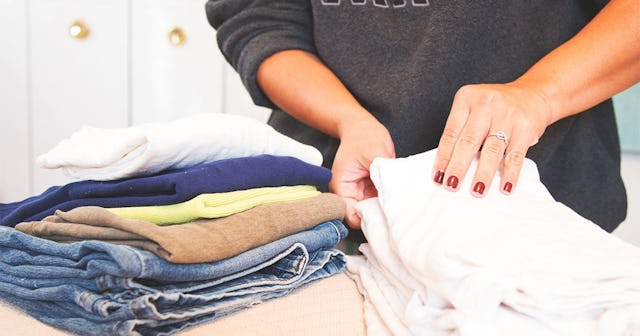How To Do Laundry During A Pandemic

Let’s face it, doing laundry is the equivalent of having a thorn lodged in your buttcheek. And now, you may be doing more of it than you ever have in your entire life thanks to COVID-19.
I’ve been stripping down each time I come home after going to the grocery store. It’s the only public place I’ve been going for the past three weeks. And I have to admit, I wasn’t doing this at first.
And now, when my son gets home from stocking shelves at night at the local Target, he washes his hands, throws his clothes in the washing machine, then washes his hands again before getting in the shower. Since learning how contagious this is, my motto has been “We can’t be too careful.” I don’t care if I have to do more cleaning to keep my family healthy.
Washing the clothes immediately keeps the germs from floating around my house like they would if I let my son have his way and throw them on his bedroom floor, step on them, pick them up to smell them and see if they are halfway clean. You get the picture.
But I’ve been wondering whether I’m doing it right. Is this overkill, or am I not doing enough to keep the virus out of my house?
If you have kids, you’re probably an expert at getting out stains like mustard and vomit, and I’m sure you know how to fight the good fight and wash everything in your house in record time after a lice outbreak. But what is the right way to do laundry while dealing with something like COVID-19?
The New York Times reports that although facts and what to do to stay safe may change as the virus progresses, your clothes shouldn’t be too high on your worry list. “Above all else, experts stress the importance of frequent hand washing with soap and water (or hand sanitizer, if you have it) as the best preventative measure,” the Times explains.
Biomedical researcher Angelique Corhals tells the Times that taking off your clothes and shoes you’ve worn out in public is a smart thing to do, though. “This is especially true if you’ve used public transportation or are working outside,” says Corthals.
So my son changing as soon as he gets home and me washing his clothes isn’t overkill after all, since he’s coming in contact with many things in the outside world, even though he’s only stocking shelves at night.
The article also notes that “if someone sneezes or coughs on you, you should change out of your clothes. And if you interact with many people at your job, you should immediately change into clean clothing and wash your hands as soon as you get home.” After any job where you come in contact with anyone or anything — even if you aren’t touching them or their credit card — you need to strip down and wash up.
Corthals says this is imperative because “If you’ve touched a contaminated surface with your clothes, sitting in a subway, leaning against a pole, there’s a chance you might bring that back home.”
The CDC says you should be using the hottest water you can while doing laundry (the laundry detergent you’ve always used is fine, but if you want to make sure it’s going to do the trick, consult this list of EPA-recommended cleaning products that are effective against COVID-19). Avoid shaking the laundry before washing it so you don’t disperse the virus through the air. Also, dry your laundry at the highest temperature you can. If you have clothes made out of materials that need to be hand washed or can’t stand the heat, it’s best to put them away and not wear them until this pandemic is over.
Another recommended precaution is wearing gloves if you are doing laundry for family members who have been outside the home. But make sure to dispose of them afterward; otherwise, you run the risk of contaminating other surfaces. Equally important is to wash your hands as soon as you’ve disposed of the gloves.
Per the same CDC guidelines, if someone in your household is sick, it’s okay to wash their laundry in the same load as others’ — but you will want to clean and disinfect your clothes hamper, or use a liner that can be either discarded or washed. And these guidelines are the same if you do your laundry in a laundromat (many of which are still open as essential services): You don’t need to worry about washing your clothes in a shared machine, but you do want to take caution with the surfaces you touch, and maintain a safe distance from other people.
The best practices for doing laundry to avoid the spread of COVID-19 are simple: wash clothes immediately when arriving home in the hottest water possible, then wash your hands since you’ve touched clothes (or wear gloves while you’re handling them). It might be a bit different than your usual laundry routine, but if these few extra steps can prevent your family from illness, it’s definitely worth it.
This article was originally published on